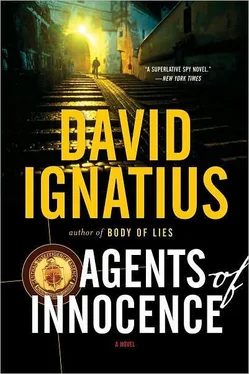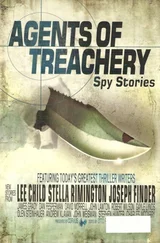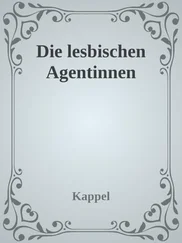David Ignatius - Agents of Innocence
Здесь есть возможность читать онлайн «David Ignatius - Agents of Innocence» весь текст электронной книги совершенно бесплатно (целиком полную версию без сокращений). В некоторых случаях можно слушать аудио, скачать через торрент в формате fb2 и присутствует краткое содержание. Жанр: Шпионский детектив, на английском языке. Описание произведения, (предисловие) а так же отзывы посетителей доступны на портале библиотеки ЛибКат.
- Название:Agents of Innocence
- Автор:
- Жанр:
- Год:неизвестен
- ISBN:нет данных
- Рейтинг книги:3 / 5. Голосов: 1
-
Избранное:Добавить в избранное
- Отзывы:
-
Ваша оценка:
- 60
- 1
- 2
- 3
- 4
- 5
Agents of Innocence: краткое содержание, описание и аннотация
Предлагаем к чтению аннотацию, описание, краткое содержание или предисловие (зависит от того, что написал сам автор книги «Agents of Innocence»). Если вы не нашли необходимую информацию о книге — напишите в комментариях, мы постараемся отыскать её.
Agents of Innocence — читать онлайн бесплатно полную книгу (весь текст) целиком
Ниже представлен текст книги, разбитый по страницам. Система сохранения места последней прочитанной страницы, позволяет с удобством читать онлайн бесплатно книгу «Agents of Innocence», без необходимости каждый раз заново искать на чём Вы остановились. Поставьте закладку, и сможете в любой момент перейти на страницу, на которой закончили чтение.
Интервал:
Закладка:
“The world of Lifta was destroyed in one night,” continued Abu Nasir. “I remember the date. It was December 29, 1947. The village elders had gone to a coffeehouse along the Jaffa Road to drink coffee and smoke the nargilleh. It was a room like this! Full of smoke and talk and dreams.
“The Jews kicked in the door of the coffeehouse and began shooting. Six of the old men were killed, including the moukhtar. I was asleep but I heard the shooting that night, and the wailing of the women. I thought the world was coming to an end. It was as if the entire village had been awakened suddenly from a dead sleep and we were terrified. Everyone thought the Jews would be coming next to their house! No one slept for the rest of the night.
“The next morning people began packing their bags. Nobody could explain exactly why. But the reason was obvious. They were terrified. The world of Lifta had been built on illusions, and when the illusions were destroyed, everything else collapsed. People took small suitcases and told each other they wouldn’t be gone long. They went nearby, to East Jerusalem or Ramallah or El Bireh. They would be back in two weeks-a month at most-when the situation calmed down and the fighting stopped. But the fighting didn’t stop. It got worse and worse, and by the next winter the war for Palestine was over. We had lost our village.”
“Or given it away,” said Jamal.
“You are right, my fine young man. We gave our village away. But that wasn’t the worst thing that happened that night in December 1947.”
“What could be worse than that?”
“The worst thing was that we lost our self-respect. The men of Lifta panicked and fled like women, and most of them are still running. Even now, many of them can’t bear to admit what happened. They have invented a myth about why they left, which they tell their children and grandchildren.”
“A myth?”
“A myth of terror. They claim that they left Lifta only after Begin and the Irgun had destroyed Deir Yassin! Every Palestinian knows about Deir Yassin. It is the incarnation of evil, and it is everyone’s excuse for defeat. And to this day, our elders tell themselves that they left Lifta only after the slaughter of the 250 poor villagers of Deir Yassin.
“But, Jamal, I will tell you something. It is a lie! The people of Lifta fled four months before Deir Yassin! They are cowards, even now. Scattered, homeless, landless. They have lost everything. And still they cannot face the truth.”
“They are pathetic,” said Jamal.
“Perhaps. But their emotions are human and timeless. And that is why I am telling you this sad story of my village. Because it is our story today. Do you doubt me? Do you think that we have learned our lesson and it cannot happen again? Listen to me for a moment more.
“After the catastrophe of 1948, many of the people of Lifta went to Amman. They had lost their village and their country. But in Jordan they were at least among brother Arabs, with passports and the rights of citizenship. The Liftawis built homes and businesses. They made a little money and perhaps they bought a car, or a bigger house, or they sent their children to university. Or perhaps they moved to Kuwait or Saudi Arabia and made even more money.”
“I know people like that,” said Jamal.
“Of course you do,” answered Abu Nasir. “They are all around you. They are the face of our people, struggling, hoping, trying to survive. The Liftawis were no better or worse than the people of any other village. They made friends with the Jordanians. They grew comfortable. They believed in the liberation of Palestine, perhaps even in the dream of returning to Lifta. They supported the fedayeen and gave us money and time. They believed they had learned the lesson that to survive in a world like this, you must be strong.
“Now I will tell you the saddest part of my story. During the fighting in Amman last September, I visited a family from my village. From Lifta. They were living in Jebel Hussein near one of the Jordanian Army positions. Do you know where that is?”
“Of course,” said Jamal.
“I asked them for help. I told them that our fighters needed their house to stop the advance of the King’s army. I pleaded, but they refused. They told me the fighting would be over soon and they would be safe. They didn’t want to have the fedayeen so close. What harm could come to them from the Jordanians? They had done nothing wrong.”
“What happened to them?” asked Jamal.
“They are all dead. The whole family was killed when an artillery shell hit their house. I cried when I heard the news, even after what had happened. Here were people who had been driven like dogs from their home in Lifta only to die like dogs in Amman!”
Jamal shook his head with a mixture of sadness and contempt.
“Now I will shock you by saying something,” continued Abu Nasir. “Our people hate Menachem Begin, don’t they? That is an article of faith for us, isn’t it?”
“Of course it is!” answered Jamal.
“But I don’t hate Begin. I admire him. His people were crushed and demoralized. They had been dragged back and forth across Europe and then gone silently to their deaths. They had trusted in the Germans-in reason and progress and assimilation-so much that they couldn’t understand what was happening to them. They died trembling, with their eyes closed, lying to themselves to the very end. But not Begin. Have you ever read his book?”
“No,” said Jamal disdainfully.
“You should. In this book, Begin put the matter of survival very simply. He said: ‘I fight, therefore I am.’ And he was right. The Jews would survive only if they were prepared to kill their enemies. Begin put his trust in the power of Jewish guns, rather than in the goodwill of others.”
Jamal nodded. He was beginning to see the castle emerging from the fog.
“Begin understood something else,” continued Abu Nasir. “He understood that terrorism is the weapon of the weak. That terrorism gives power to the weak by making their enemies afraid. He understood that if you have the ability to create fear, then you have power.
“I will tell you something from my heart about terrorism, Jamal. Do you know what I feel when I read in the newspapers about Palestinian ‘terrorists’ who have hijacked airplanes and killed civilians? Or when I read that the Palestinians are cruel and ruthless and inhuman? Intellectually I am critical, of course, because Fatah’s official line is to oppose international terrorist operations. But do you know what I feel in my heart and my stomach?”
“What do you feel?” asked Jamal, almost in a whisper.
“I feel proud! It makes me happy to know that they are afraid of us. I like to see the look of fear in people’s eyes when I walk down the street. If I hear someone say behind my back, ‘Be careful of him! He is a madman! He is a killer!’-I am happy for the rest of the day.”
Jamal nodded. Yes, he thought. That is what I feel. That is what every Palestinian feels. We may not defeat the Jews, but at least we can make them fear for their lives.
“I would like to tell you a secret,” continued Abu Nasir. “It is what the Egyptians would call a secret of state. Something that Nasser said, which I swore I would never tell anyone else. But now that Nasser is dead, God rest his soul, I will tell you. The first time Nasser met the Old Man was in 1967. At the end of the meeting, after much talk back and forth, Nasser said to him: ‘Why not be our Begin?’ ”
“ Begin? ” asked Jamal.
“Yes. We didn’t believe Nasser. We thought he was joking. But he was right.”
“What are you saying, Uncle?”
“Our people are dying! It is happening to us again. The resistance is scattered, our morale is broken, our people are in flight. This time our enemy is an Arab leader, the King of Jordan, but that is the only difference. September 1970 is the same as December 1947. Another generation is developing the psychology of defeat. They are already inventing the lies they will tell their children about the events of Black September! We are dying as a people, vanishing into history on a tide of defeat and self-deception.
Читать дальшеИнтервал:
Закладка:
Похожие книги на «Agents of Innocence»
Представляем Вашему вниманию похожие книги на «Agents of Innocence» списком для выбора. Мы отобрали схожую по названию и смыслу литературу в надежде предоставить читателям больше вариантов отыскать новые, интересные, ещё непрочитанные произведения.
Обсуждение, отзывы о книге «Agents of Innocence» и просто собственные мнения читателей. Оставьте ваши комментарии, напишите, что Вы думаете о произведении, его смысле или главных героях. Укажите что конкретно понравилось, а что нет, и почему Вы так считаете.












